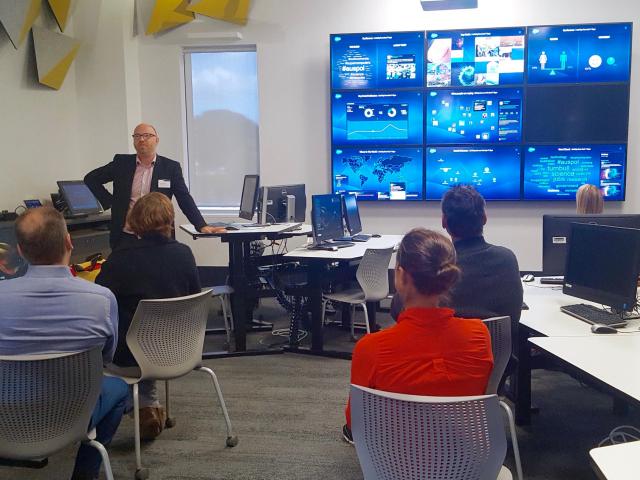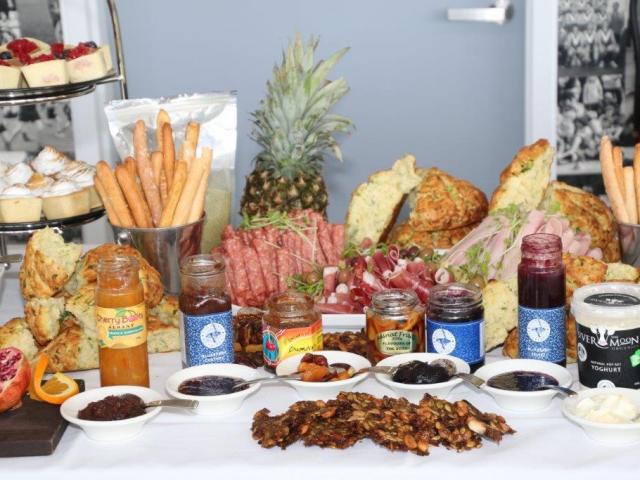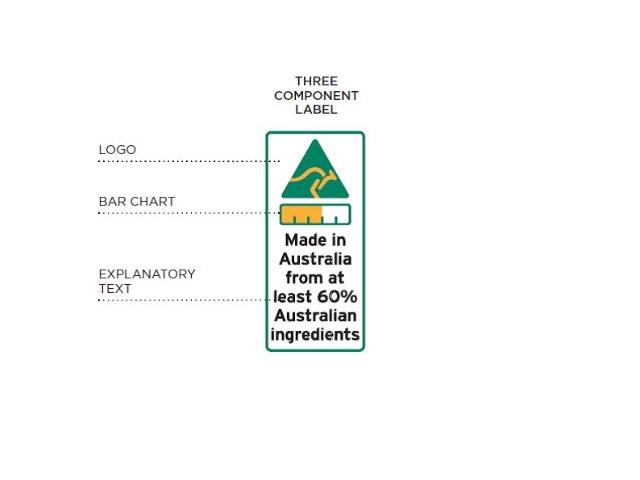Networking invaluable on Food and Beverage Business Study Tour
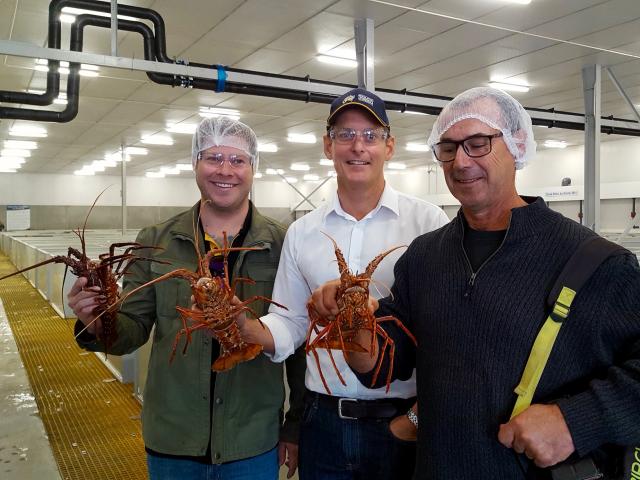
Networking, knowledge-sharing and a first-hand look at the facilities and innovative techniques of a select group of Western Australian businesses, were highlights of the Food Industry Innovation project’s first Regional Food and Beverage Business Study Tour from 2-4 May.
Twelve agrifood stakeholders participated in the tour including visits to a cross-section of WA food and beverage businesses, the opportunity to speak with business owners about their journeys, and presentations from industry experts.
Starting in Perth, the first stop was Curtin University’s School of Luxury Branding where researchers are using innovative psychophysiological equipment to measure a consumer’s physical responses to stimuli. Eye tracking, facial recognition and measuring brain waves are just a few interesting ways the consumer experience is being measured.
Study Tour participants also visited Curtin’s ‘The Agency’ and Social Media Command Centre; designed to simulate a contemporary marketing communication consultancy. The teaching and research facility boasts nine large screen monitors, allowing for real-time online trend tracking and social media marketing analytics for actual events and campaigns.
The group was excited to learn about industry engagement opportunities with Curtin in the areas of luxury branding research, social media marketing and digital analytics.
Other Perth-based Study Tour business hosts included Whipper Snapper Distillery, Geraldton Fishermen’s Cooperative, Fremantle Octopus and Mundella Foods.
Participants were especially interested to hear about Geraldton Fishermen’s Co-op’s marketing into China, direct sales and online successes.
A networking dinner was held at The Shoe Bar and Café in Yagan Square - a Buy West Eat Best program member that sources locally farmed, fished and produced ingredients. The department’s Buy West Eat Best program manager Melissa Worthington attended the dinner, providing tour participants with information about the program and membership opportunities.
The tour continued down to the state’s South West, where the second networking dinner was held at Swings Taphouse in Margaret River. South West Development Commission’s TradeStart manager Mat Lewis along with TradeStart advisor Simon Taylor provided attendee’s valuable insight into the TradeStart program along with advice for new businesses planning to export.
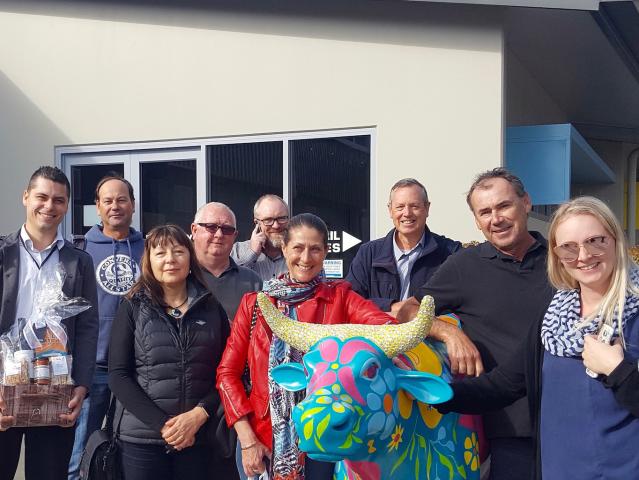
The following day included a site visit to Margaret River Dairy Company, an industry networking lunch at Amelia Park Restaurant to hear two regional business heroes share their journeys to export success, and a tour of the backhouse value-adding facilities, including the bakery at Bunbury Farmers’ Market.
Key learnings from Study Tour participants:
- “The networking for us as regional businesses, has been invaluable. We won’t be able to put a price on what we’ve got out of this Study Tour.”
- “I picked up lots of ideas from talking to other members of the tour and am reassured to hear we are all having the same issues in terms of getting our products out there and recognised.”
- “The engagement and connection with other businesses on this tour has been really worthwhile. Being able to understand the processes behind getting other products from primary to value-added stages, have been interesting and helpful.”
- “I am really excited about the potential technological opportunities presented by Curtin University as part of their marketing presentation.”
- “We’re really proud of the fact we’re from Western Australia. It’s a huge and beautiful state – knowing we can join Buy West Eat Best is very valuable.”
- “Consumer dynamics are changing, we need to work forward to add value and meet their requirements.”
For more information about upcoming Study Tours and networking opportunities, email the Food Industry Innovation team at: FoodIndustryInnovation@dpird.wa.gov.au
New Facebook group fosters industry connection
You’re invited to join the new WA Food and Beverage Network closed Facebook group – a supportive and interactive online space aimed at fostering a Western Australian (WA) food and beverage industry connection, collaboration, and inspiration through knowledge-sharing.
WA Food and Beverage Network is an initiative of the Department of Primary Industries and Regional Development’s Food Industry Innovation project based on feedback from WA food and beverage businesses.
Our vision and hope is for you, Western Australia’s food and beverage industry, to build a sense of ownership of the group by engaging in relevant, targeted discussion about your business journeys, successes and barriers to growth.
It is an opportunity to connect with fellow WA food and beverage industry producers, processors, service providers, mentors and leaders – and to steer the conversation in the direction you choose.
We’ve heard consistent feedback from WA food and beverage stakeholders that the diverse, dispersed nature of the industry poses a major business challenge. WA businesses operating in isolation can face a huge task competing against established international brands and identifying new markets. They are often constrained by limited collaboration opportunities, a lack of market analysis resources and insufficient infrastructure.
Creation of this Facebook group is the result of WA premium and value-add food and beverage stakeholders voicing the need for a collaborative network to help bridge identified gaps across the industry, develop skills, share business learnings, and overcome barriers to growth.
The group will be focused on encouraging in-depth learning across areas of identified business gaps including: branding and labelling, capturing export opportunities, agri-tourism, e-commerce, food technology, and process engineering.
Content will be posted to the group in the form of videos from industry experts; interviews and live Q&A chats with industry leaders; business case studies; articles; information about upcoming events and training workshops; report summaries; consumer behaviour trends; business linkages and collaboration opportunities.
We look forward to your participation to build this online network into a vibrant community that is passionate about seeing WA food and beverage businesses grow and reach their full potential.
Join the WA Food and Beverage Network by answering a couple of qualifying questions today!
Beefing up WA’s premium meat opportunities
Organic and biodynamic, Wagyu and beef based meat snacks have been prioritised as significant areas of focus to grow Western Australia’s value-added premium beef sector.
Working together with Meat and Livestock Australia Donor Company (MDC) the Department of Primary Industries and Regional Development’s (DPIRD) Food Industry Innovation project (FII) will deliver the Premium Beef Project.
Aligned with the state government’s intent to enable the primary industries sector and regions to increase international competitiveness and grow in value and MDC’s plans to grow the premium beef sector this project aims to assist willing participants along the WA supply chain of these three priority areas to develop by becoming more coordinated and market orientated.
Based on the findings and insights from the Premium Market Opportunities report, commissioned by the FII project in 2016 the first phase of the Premium Beef Project will validate these three premium opportunities across the supply and value chains and consult with beef industry stakeholders on issues, opportunities and challenges to achieving growth in these priority segments.
“The initial phase of the project will guide the application of resourcing to help facilitate development of the premium beef supply and value chain” DPIRD’s Western Australian Premium Food Centre manager Jon Berry said.
“Independent market research shows Wagu beef, organic and biodynamic beef and snack manufacturing (such as beef jerkies, biltong and sticks) are experiencing increasing consumer demand internationally, especially in Asia.
“Although operators within these sectors in WA are typically smaller scale in comparison to mainstream beef production, WA’s ‘clean and green’ reputation augers well for industry growth as demand for protein increases as a result of higher incomes in Asia”.
A report will be completed by late July 2018, which will identify:
- ‘real’ long term strategic competitive advantages for WA beef premium production
- key market leading ‘value add’ opportunities for premium beef products that leverage competitive advantages
- what the market is demanding, rather than what the production system is generating
- “willing participants” who seek to pursue the opportunities matched to consumer demand – this will be drawn out by personal interviews at the enterprise level
- premium product buyers - what are they wanting and explore how this can be delivered by WA producers
- specific opportunities that the FII project and other parts of DPIRD can engage with to progress premium beef industry growth in a meaningful and tangible way.
For more information about the WA Premium Beef project please contact Jon Berry on phone +61 (08) 9899 9283 or email Jon.Berry@dpird.wa.gov.au
Forum provides a feast for top minds
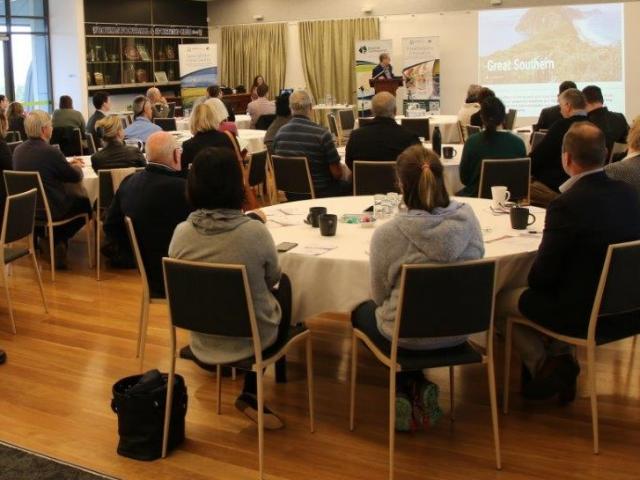
Supporting growth of premium and value-add food and beverage businesses in the Great Southern region was the focus at the Premium Food and Beverage Forum in Albany on 28 June 2018.
Hosted by the Department of Primary Industries and Regional Development Food Industry Innovation (FII) project and Regional Development Australia Great Southern, the forum brought together more than 65 premium agrifood producers, processors, industry leaders and local and state government representatives.
In his address via video to the forum, global food trend expert Professor David Hughes excited the audience with his views on the premium food industry and the opportunities it presents for investment.
“I can’t think of a better time in my professional career where there are such large opportunities for the smaller medium enterprises in food and drink” he said.
The Forum discussed how important agriculture is for the Great Southern Region and identified value-adding opportunities that will help to continue to create jobs and boost the region’s economic development in the agrifood sector.
Three successful businesses including The Lake House-Vinofood, Limeburners and Dellendale Creamery provided an insight into the strategies that helped them grow and expand and how they had overcome challenges along the way.
The event was catered by Three Anchors who sourced an impressive array of produce, premium products and indigenous flavours, all from the Great Southern region.
As part of the forum, a workshop using innovative facilitation technologies captured the participants’ ideas of how businesses, government and industry can guide growth of value-adding in the region.
Marketing and branding for premium food and beverage businesses was identified as a key area of support required. The FII team have been working to secure a number of workshops on this topic and more that will be rolled out in the region over the next year.
Also highlighted were a range of business support initiatives including the department’ s new FII Expert for a Day program which is an example of how government can support the growth of premium agrifood businesses.
The outcomes of the forum’s facilitated workshops will feed into the Food Industry Innovation capacity building program to ensure that premium food and beverage business needs are met.
For more information about the forum please contact Kaylene Parker on phone +61 (08) 9892 8416 or email FoodIndustryInnovation@dpird.wa.gov.au
Expert support program to help food businesses reach potential
About 25 Western Australian premium food and beverage businesses have registered their interest for the Food Industry Innovation project’s new Expert for a Day initiative and other business support programs.
Expert for a Day was launched in May at Amelia Park restaurant in Margaret River and is designed to help premium food and beverage producers reach their full potential, overcome barriers to growth and capture new market opportunities.
It is among a suite of programs offered by the department to support the state’s premium food and beverage businesses break new ground and deliver outstanding product to customers domestically and abroad.
“By providing support for initial engagement with expert service providers, the project aims to inspire ongoing use of skilled advisers and enhance the capability of WA premium agrifood businesses,” department Food Industry Innovation manager Kim Antonio said.
Eligible businesses will have access to a range of industry experts whose skill sets address gaps or ‘opportunities for improvement’ identified in the Premium Agrifood Market Opportunity report.
This includes expert advice in branding and marketing; packaging and labelling; e-commerce; logistics; sales capacity; pricing strategies; process engineering; food technology and exporting premium food and beverages.
Registrations are still open for participation in the Expert for a Day initiative and other support programs.
For more information, contact the Food Industry Innovation team via email at: FoodIndustryInnovation@dpird.wa.gov.au
Honest business relationships the key to export success
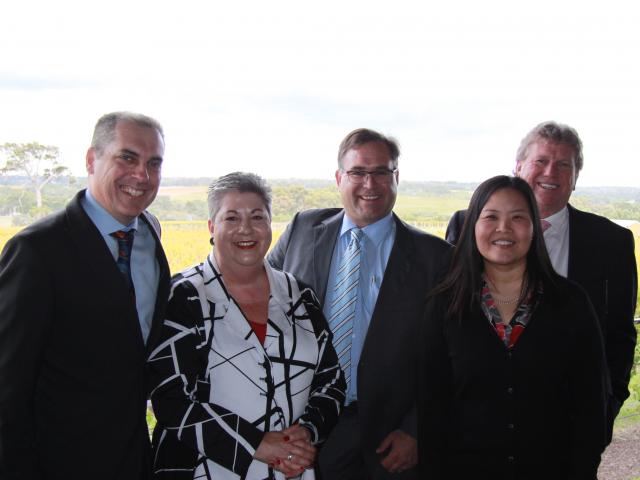
Two regional Western Australian export heroes shared their business journeys, learnings and successes at the fifth ‘In Conversation’ event on 4 May, aimed at inspiring local agribusinesses to export greatness.
This was the final lunch in the business event series, hosted by the department’s Asian Market Success and Food Industry Innovation projects in partnership with the Export Council of Australia.
About 60 premium food and beverage producers and industry stakeholders attended the event set among scenic vineyards at Amelia Park Restaurant in Margaret River.
V&V Walsh chief executive Peter Walsh and Burch Family Wines chief executive Anthony Wilkes were guest speakers, opening up about what it takes to be successful exporters in their respective sectors.
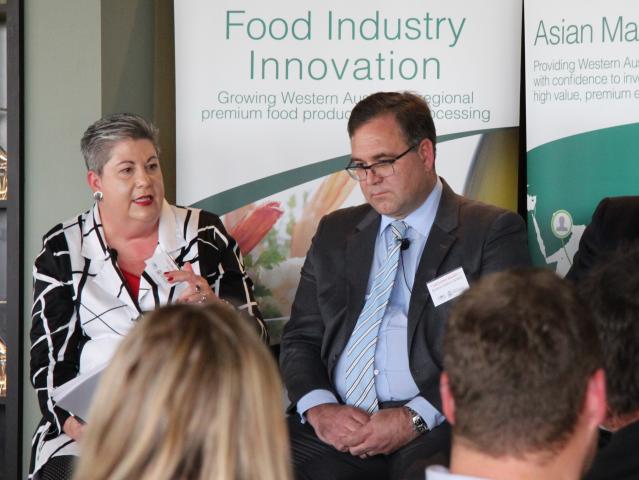
Bunbury-based V&V Walsh is the biggest lamb and beef processor in the state, a leading meat supplier to the domestic market, and an exporter to many countries including China.
Burch Family Wines is one of WA’s leading family-owned and operated wineries with an international reputation for crafting balanced and elegant wines of distinct regional character.
Its brands include Howard Park, MadFish, Marchand & Burch, and Jeté.
Mr Walsh and Mr Wilkes agreed business and export success always came back to being honest, authentic and working at good relationships.
“Don’t let greed drive you,” Mr Walsh said.
“It always comes back to business relationships – it’s a trust built up over time that becomes a business friendship.”
When asked for his top exporting tip, Mr Wilkes said don’t be afraid to ask questions.
“It’s a long-term commitment… a marathon, not a sprint. Talk to people like us who have been and done it. A competitor in this market could be a friend in a foreign market,” he said.
For more information, contact the Food Industry Innovation team via email at: FoodIndustryInnovation@dpird.wa.gov.au
Country of Origin Labelling workshop
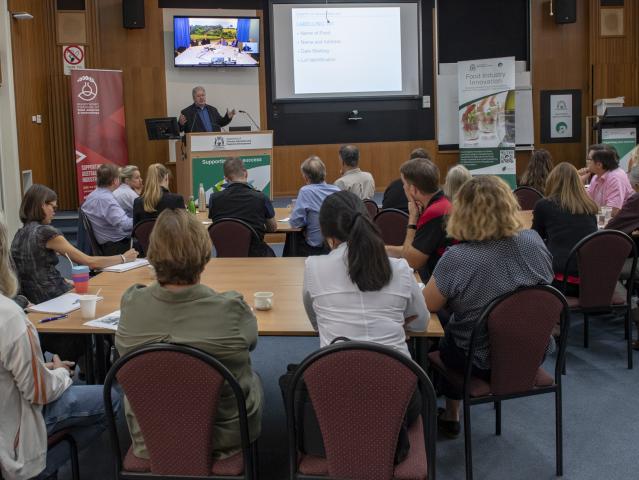
The new Australian country of origin labelling (CoOL) regulation for food and beverages came into force from 1 July. CoOL is now regulated under Australian Consumer Law instead of the Australia New Zealand Food Standards Code where it has been captured until now.
A CoOL workshop was held on 13 April in response to an identified need of small medium food and beverage enterprises that were unclear on the complexities of the new regulatory requirements.
Through the Australian Institute of Food Science and Technology (AIFST), DPIRD was able to secure the services of Chris Preston a legal and regulatory specialist.
DPIRD promoted the workshop to WA businesses and offered an option for businesses in regional areas to participate via videoconference from DPIRD regional offices. AIFST promoted the event to its members and assisted with registrations.
Approximately 50 people attended the workshop at DPIRD South Perth and about 10 people took advantage of videoconferencing to the DPIRD regional offices of Northam, Bunbury, Manjimup and Albany.
The presenter went through the requirements of new information standard and offered suggestions and practical tips on how businesses could approach setting up their labels and managing compliance and records. Some components of the regulation which were not readily apparent such as the treatment of added water, were also illustrated.
There was a high level of engagement between the attendees and the presenter, with many questions asked throughout the morning.
A follow up online survey run by AIFST with 65% of respondents reporting that they found the presentation ‘extremely useful’ and other feedback including ‘ I am much better prepared for utilising labelling now that I have had it explained’.
Key takeaways:
- Remember that the purpose of CoOL labelling is to provide detail on the Australian component of a product, whether it is the percentage of ingredients or manufacturing conditions, i.e. Australian-ness.
- Data – can you prove your claim? Records – ensure you keep detailed records including declarations from ingredient suppliers. Product Information Forms (PIFS) are useful for this purpose.
- Be sure of your ingredient sourcing.
- Don’t fear under-declaring. Be clear on the difference between Minimum Content and Average Content – always better to underestimate the guaranteed percentage of Australian ingredients than overestimate.
- Understand ‘Made In’ claims and the expanded definition versus ‘Product of’ claims.
- Water as an ingredient – the three rules which need to be observed.
- Keep the information in the labelling text box simple – any additional information that you want to provide to consumers, i.e. regionality, organic status etc. to be provided outside the box, ensuring that the information is neither misleading or deceptive
- If in doubt, read the Information Standard, especially the dictionary definitions in the Standard.
For further information watch the recorded video of DPIRD’s Country of origin labelling workshop via the department’s YouTube, read the ACCC’s Country of origin labelling information and use the online CoOL tool available on the federal government’s business.gov.au website.

